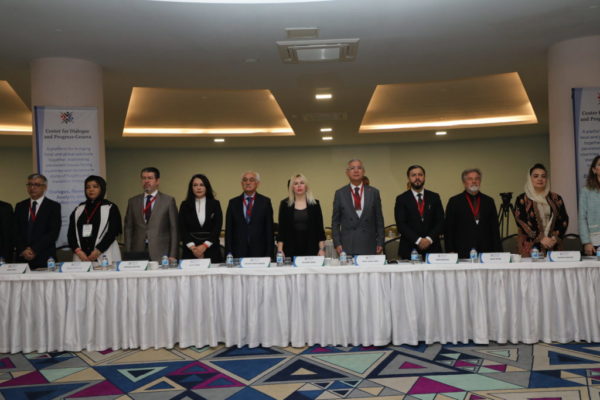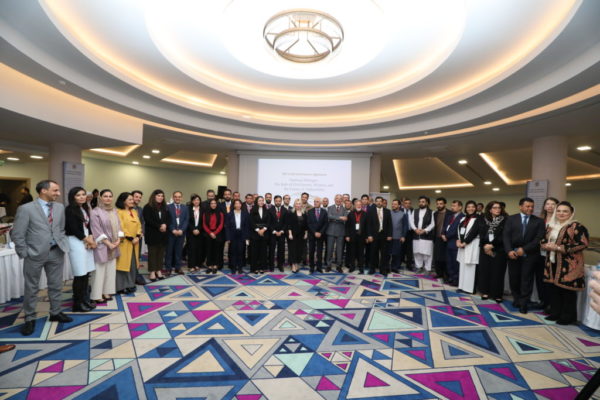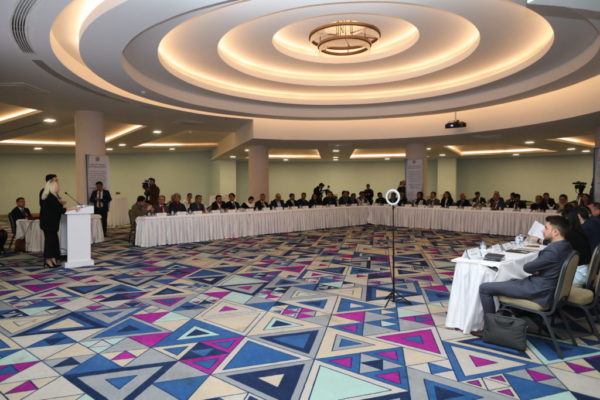National Dialogue; Role of Civil Society, Women and the Future of Afghanistan
The Conference was organized by the Centre for Dialogue and Progress – Geneva (CDP-G) in partnership with Akdeniz University – on March 16 and 17, 2023, in Antalya, Türkiye.
On the 16th and 17th March 2023, over 60 leaders of civil society, political figures, young professionals, activists, intellectuals, human rights activists, journalists, members of Afghanistan’s community, men and women with diverse socio-political backgrounds gathered in Antalya, Türkiye as part of the 2nd Conference on National Dialogue: Role of Civil Society, Women and the Future of Afghanistan.
Building on the discussions started in Geneva (Oct. 13-14, 2022), the participants extensively discussed and exchanged views on the challenges facing Afghanistan, and the role the civil society, democratic political forces, and women shall play in restoring peace, democratic governance, and preventing war.
As a result of in-depth interactions, dialogue, panel discussions, questions and answers, and expert analysis, the participants in various panels of the conference highlighted the following key points:
Summary of Discussions and Recommendations
National Dialogue, Restoring Peace and Democracy
Despite the claim that (negative) peace has come to Afghanistan, the country urgently needs a national dialogue to bring durable peace and prevent a civil war. The quest in domestic and international circles for an alternative to the Taliban highlights the importance of unity among democratic forces in and outside Afghanistan. Creating a narrative that challenges the Taliban’s undemocratic approach to governance is a prerequisite for any dialogue.
Ensuring peace and sustaining it requires tending to the different aspects of the conflict. This requires a deep and frank discourse among the citizens of a country that has been in conflict for nearly 50 years. The peace culture is the stepping stone for achieving peace. Positive peace will only be achieved if we consider the interests of all the groups, including the Taliban, in a framework that has to be defined. To safeguard the values that help secure peace and promote unity and prosperity, we have to enshrine them in the constitution and other relevant laws.
The experience of local governance in Afghanistan indicates that one of the ways to achieve peace, public accountability, and participation could be administrative and political devolution and decentralisation.
While there are different opinions on the definition of legitimacy and inclusivity, the only mechanism that can determine a legitimate and inclusive government is the election. The Constitution of 2004 considered Sharia in all parts and also upheld the fundamental rights of the citizens. A country cannot be ruled without a constitution that is based on the will of the people. Constitutionalism has its roots and place in the earliest Muslim societies and has developed over time in the majority of Muslim countries. The lessons learned from these societies and countries should be used to create a constitutional and representative government that adheres to the tenets of Sharia.
An inclusive government can be defined based on popular and international standards, not through the participation of figureheads.
Legitimacy, Inclusive Governance, and Pluralism
Constitutionalism and Sharia
Participants agreed that Afghanistan needs a new social contract in the form of a constitution that defines how the will of the people results in establishing a legitimate government. The government of the Taliban has neither domestic nor international legitimacy.
Sharia experts highlighted that there is no consensus on a single definition of Sharia. In addition, it was highlighted that the Taliban have misinterpreted the Sharia to justify their actions. In Islam, there is no one modality for establishing a political regime, however, there are criteria, the most important of which is the will of the people. It is also imperative to see how other Muslim countries balanced the application of Sharia and a modern constitutional government that is based on the will of the people.
Domestic and international pressure should be exerted on the Taliban to alter their policies on women. To prevent and circumvent the negative impact of the ban on women’s education, avenues should be explored, including providing online education to women. However, this is not sustainable or appropriate for the long term.
The media lost its freedom in Afghanistan following the Taliban military takeover. The Taliban’s Intelligence Office, the Ministry of Vice and Virtue, and the Ministry of Information and Culture have systematic control over the media. The activities of some prominent media outlets are banned. Furthermore, the lack of revenues has put an end to the activities of many media outlets and countless journalists have lost their jobs. Besides, the personal activities and even the activities of journalists on social media are followed by the Taliban. There is no specific procedure for the legal arrest of journalists. They have also circulated a list of individuals that cannot be interviewed by the media outlets.
The media in exile have filled the gap to a large extent. Despite the fact that access to information is a significant challenge, they should continue their work and professionalise their teams. The Taliban are extensively using social media to change public perceptions about themselves. By giving a true picture of the situation and systematic violations of human rights, the media in exile can counter the spread of such false perceptions.
Social media has had a tremendous impact on women’s movements and has given women a voice. Some women even use online forums for commercial activities. Social media have also contributed to the harmonisation of women’s movements in the region, particularly among the women of Afghanistan and Iran. There is currently a fear that women will be completely dismissed from the media; alternative channels such as social media channels could potentially fill the void.
The culture of impunity undermines any peace efforts in Afghanistan. Perpetrators of human rights violations should be held accountable using international mechanisms. The International Criminal Court and International Court of Justice, which Afghanistan is a member of, can be venues for taking the perpetrators of human rights into account. Civil society organisations can be helpful in the documentation of evidence and its presentation to the relevant tribunals.
Women’s Rights, Media Freedom, and Other Fundamental Rights
Engagement of the Youth and Women
The youth constitute the majority of the population. Women make up more than half of the population. Given the suffering of the women and youth, these two categories should be well represented in any future dialogue on the future of Afghanistan.
Respecting the rights of everyone (particularly women) is of utmost importance. Changing the prevalent individual interests-centered approach in civil society organisations to an institutional one is critical for this purpose.
Socioeconomic well-being is severely worsening, with 28.3 million Afghans living in poverty.
The Taliban’s policies such as banning women from working in the humanitarian assistance sector have exacerbated the crisis and affected the humanitarian aid delivery and the quality of the service.
An effective mechanism should be developed to accurately evaluate the process and to ensure that the aid delivery and distribution are transparent.
Since the UN has become a key carrier of international assistance to Afghanistan, it is crucial that the UN is held accountable for its expenditures and distribution of aid to people in need. Currently, such a mechanism does not exist. We ask the UN to publish reports detailing how the money is spent in Afghanistan.
Published reports claim that revenues increased in 1401, with 54% coming from customs. it was argued that given the dire level of poverty and unemployment, an increase in tax revenue is efficiency or extortion. Moreover, almost half (45%) of the budget is allocated to the security sector. While revenue collection is improved, corruption exists at the upper level, and in the manner which the collected revenues are spent is non-transparent.
Humanitarian Affairs, Revenue Collection, and Accountability
Private Sector
The collapse of the government has had a negative impact on the private sector, with investors losing 40-60% of their capital/investments. The private sector likes to maintain neutrality to continue to operate and compensate for the losses incurred. Additionally, the private sector’s links to international financial and commercial institutions need to be restored.
International and regional powers, as well as Afghanistan’s neighbours, should work with the Taliban under certain conditions, in a way that is open, accountable, and respectful of human rights. The Taliban are unwilling to engage with other political groups unless the pressure from the international community increases.
Moving forward, the international community will need to work closely with all Afghans to address the challenges facing the people. To facilitate discussions, UNAMA should, in accordance with its renewed mandate, cease its passive role and engage in seriously with all relevant stakeholders, including civil society in exile, in order to facilitate the development of a roadmap for the establishment of a legitimate and representative government in Afghanistan.
Regional engagement with the Taliban is based on short-term interests rather than strategic planning. The Taliban have failed to meet the expectations of regional and international actors in ensuring security and economic development.
Disengagement is prevalent with non-Taliban political forces, owing to their inability to come together and shape a united narrative of what they want for Afghanistan. In the absence of a common vision or narrative for the future of Afghanistan among anti-Taliban elements, regional and international actors engage, even if tactically, with the Taliban to pursue their interests. These dynamics will only change when a new shared narrative and political alternative force to the Taliban emerges. Processes and mechanisms like the conferences organised by CDP-G and similar efforts shall be continued and strengthened to help build and achieve unity.
In a newly evolving international order, attention to two dimensions is crucial: domestic and foreign. After long and painful experiences and given the changing dynamics in the region, domestically, decentralisation, and internationally, a neutral foreign policy is an approach to be duly explored as an element for achieving stability.
In a post-US/NATO Afghanistan, the region can and should play an active role in bringing peace to Afghanistan. In this context, the legitimate concerns of all countries in the region shall be duly considered.
International and Regional Engagement and the UN Role
Networking among the Civil Society Members
Building better coordination and partnership among members of civil society is key if they want to have a voice in forming a democratic future in Afghanistan.
CDP-G is urged to continue facilitating the dialogue among the members of civil society and organise thematic and expert discussions that produce clear recommendations on different aspects of the future of Afghanistan. After the conclusion of two significant conferences, it is time to institutionalise and regularise the network of civil society and professional groups that attended and contributed to the success of these dialogues. CDP-G will serve as a secretariat for coordination, facilitating review of the discussions, and written policy outputs, and drawing joint plans for activities of the network in the upcoming years.
Digital technologies and platforms can help civil society organisations and activists connect. The participants of the conference were shown a model of a virtual platform for civil society meetings. The CDP-G will build further on the idea.
CDP-G is committed to further work on the implementation of the recommendations of the conference, including the organisation of dialogue on specific themes such as legal and constitutional matters, facilitating online and in-person interactions between the participants, operationalizing a civil society network, and forming expert groups to feed into a national dialogue on the future of Afghanistan.



